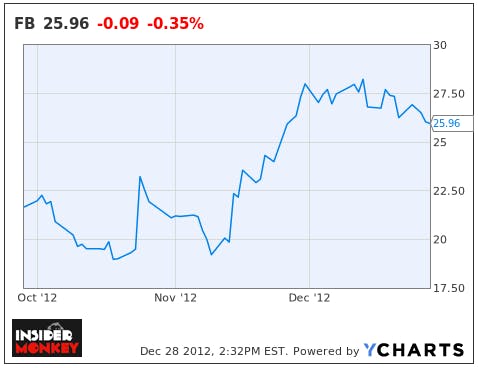Facebook Inc (NASDAQ:FB)‘s stock price has been booming over the past three months, up almost 20% at the time of this writing. With no earth-shattering news releases on the docket for today, it was likely a surprise to early-morning traders that shares of the social media giant were down as much as 2.9% in the market’s first few hours.

Originally reported by Quartz, which is known for its typically insightful commentary, the moderate selloff may have been the result of an article in the New York Post concerning research from AppData. In the original piece, AppData is said to have found that the user base of “Instagram, which peaked at 16.4 million active daily users the week it rolled out its policy change, had fallen to 12.4 million as of yesterday.”
Now, the Post was quick to claim that this means Facebook Inc (NASDAQ:FB)’s Instagram “may have shed nearly a quarter of its daily active users in the wake of the [terms of service] debacle,” with AppData cited as saying “[We are] pretty sure the decline in Instagram users was due to the terms of service announcement.”
As Quartz so ardently points out though, this data set is “only talking about a subset of Instagram users,” adding that it “might be representative, but it might not. The claim that Instagram has lost a quarter of its users isn’t supported by this data.” The critique also mentioned that the declines didn’t occur until December 23rd, a full week after Facebook Inc (NASDAQ:FB) and Instagram’s TOS announcement.
So what else is wrong with this picture?
There’s obviously nothing nefarious about the way AppData collects their statistics, as it’s impossible to measure a sample size in its entirety, but it’s the blogosphere’s reaction to the report that should receive criticism.
Equally as troubling is the fact that other media outlets re-posted the story without considering the flip-side of the argument. Taking a look back at some recent news gaffes over the past few months though, we can see that these issues have occurred before.
Consider the case of Black Friday, when most armchair analysts used analysis done by Piper Jaffray and Gene Munster to claim that Apple dominated Microsoft in tablet sales. There’s no question that this could’ve have happened, but the original report only compiled eight hours of survey data at one particular location.
Now, Munster and his team didn’t draw any overarching conclusions, but many journalists misread this information, automatically assuming that it could be applied to the tech world in its entirety.
And let’s not forget about the fake press release claiming Google paid $400 million for a company with a market cap under $1 million. Obviously, common sense would hold that this could not be possible, but that didn’t stop the majority of news sites (not us, though), from posting the story as certifiable fact.
Both of these scenarios run parallel to the AppData/Instagram coverage that may have hurt Facebook Inc (NASDAQ:FB) today, so the adequate question we must ask is: why aren’t journalists held accountable for misinterpreting data if it has a material effect on a stock’s price?
Let us know your thoughts in the comments section below, and for more coverage of these issues, continue reading here:
Who Faked The Google Acquisition Story?





